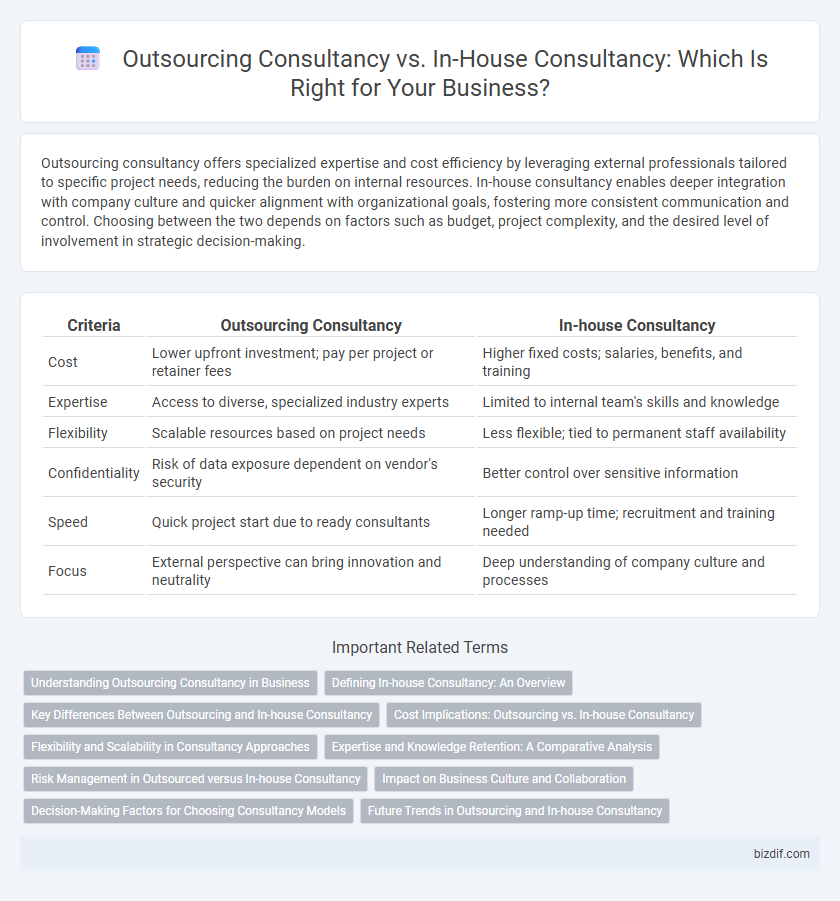Outsourcing consultancy offers specialized expertise and cost efficiency by leveraging external professionals tailored to specific project needs, reducing the burden on internal resources. In-house consultancy enables deeper integration with company culture and quicker alignment with organizational goals, fostering more consistent communication and control. Choosing between the two depends on factors such as budget, project complexity, and the desired level of involvement in strategic decision-making.
Table of Comparison
| Criteria | Outsourcing Consultancy | In-house Consultancy |
|---|---|---|
| Cost | Lower upfront investment; pay per project or retainer fees | Higher fixed costs; salaries, benefits, and training |
| Expertise | Access to diverse, specialized industry experts | Limited to internal team's skills and knowledge |
| Flexibility | Scalable resources based on project needs | Less flexible; tied to permanent staff availability |
| Confidentiality | Risk of data exposure dependent on vendor's security | Better control over sensitive information |
| Speed | Quick project start due to ready consultants | Longer ramp-up time; recruitment and training needed |
| Focus | External perspective can bring innovation and neutrality | Deep understanding of company culture and processes |
Understanding Outsourcing Consultancy in Business
Outsourcing consultancy in business involves hiring external experts to provide specialized knowledge and strategic advice, enhancing efficiency and reducing operational costs. These consultants bring industry-specific insights and scalability that in-house teams may lack, enabling companies to tackle complex challenges without long-term commitments. Leveraging outsourcing consultancy allows businesses to access innovative solutions and global best practices while maintaining focus on core activities.
Defining In-house Consultancy: An Overview
In-house consultancy refers to a dedicated team of experts employed within an organization to provide strategic advice and solutions tailored specifically to internal needs. This approach ensures deep organizational knowledge, faster decision-making, and alignment with corporate culture and objectives. In-house consultants offer continuous support and direct collaboration, enhancing project integration and long-term value delivery.
Key Differences Between Outsourcing and In-house Consultancy
Outsourcing consultancy offers access to specialized expertise and cost flexibility, allowing companies to scale services based on project demands, unlike in-house consultancy which requires continuous investment in employee development and infrastructure. In-house consultancy provides greater control over company-specific knowledge and faster internal communication but may lack the diverse industry perspectives and innovation brought by external consultants. Decision-making often hinges on balancing budget constraints, the need for customized solutions, and the desired speed of implementation across these two consultancy models.
Cost Implications: Outsourcing vs. In-house Consultancy
Outsourcing consultancy often reduces fixed overhead costs by converting them into variable expenses, which can optimize budget allocation and improve cash flow management. In-house consultancy involves higher costs related to salaries, benefits, training, and infrastructure maintenance, leading to significant long-term financial commitments. Choosing outsourcing enables businesses to access specialized expertise on demand, minimizing idle resource expenses and enhancing cost-efficiency compared to maintaining a permanent internal team.
Flexibility and Scalability in Consultancy Approaches
Outsourcing consultancy offers greater flexibility by enabling businesses to quickly adjust resource allocation based on project demands without long-term commitments. Scalability is enhanced through access to diverse expertise and specialized skills that can be ramped up or down efficiently. In contrast, in-house consultancy provides consistent control but often lacks the agility to scale or pivot rapidly in response to evolving market conditions.
Expertise and Knowledge Retention: A Comparative Analysis
Outsourcing consultancy offers access to a diverse pool of specialized expertise and industry insights that may be cost-prohibitive to maintain in-house, enhancing strategic flexibility and innovation. In-house consultancy supports deeper organizational knowledge retention and alignment with company culture, ensuring continuity in project execution and long-term strategic initiatives. Balancing outsourced expertise with internal knowledge assets optimizes operational efficiency and sustained competitive advantage.
Risk Management in Outsourced versus In-house Consultancy
Outsourcing consultancy offers specialized risk management expertise, leveraging global industry best practices and advanced analytical tools often unavailable in-house. In-house consultancy allows for greater control and immediate access to organizational context, enhancing tailored risk mitigation strategies aligned with company culture. Balancing outsourced resources with internal knowledge mitigates risks related to data sensitivity, communication gaps, and compliance, optimizing overall risk management effectiveness.
Impact on Business Culture and Collaboration
Outsourcing consultancy introduces diverse external perspectives that can foster innovation but may challenge existing business culture and slow internal collaboration due to communication barriers. In-house consultancy aligns closely with company values, promoting seamless collaboration and reinforcing a unified culture through direct team integration. Balancing these approaches requires evaluating the impact on organizational cohesion and agility to optimize decision-making and employee engagement.
Decision-Making Factors for Choosing Consultancy Models
Choosing between outsourcing consultancy and in-house consultancy depends largely on factors such as cost efficiency, access to specialized expertise, and the desired level of control over projects. Outsourcing consultancy often provides flexibility and diverse industry insights, while in-house consultancy ensures alignment with company culture and quicker internal communication. Key decision-making factors include budget constraints, project complexity, confidentiality requirements, and long-term strategic goals.
Future Trends in Outsourcing and In-house Consultancy
Future trends in outsourcing consultancy emphasize increased reliance on AI-driven analytics and cloud-based collaboration platforms, enhancing scalability and cost-effectiveness. In-house consultancy is evolving with a focus on developing specialized skill sets and integrated digital tools to maintain strategic control and agility. Hybrid models combining outsourced expertise with internal teams are gaining momentum, leveraging the strengths of both approaches for optimized decision-making and innovation.
Outsourcing Consultancy vs In-house Consultancy Infographic

 bizdif.com
bizdif.com